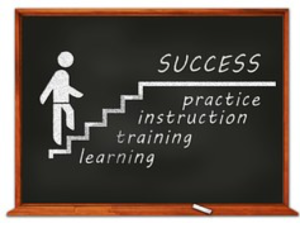- You are here:
- Home »
- Blog »
- Prepare for your IELTS Exam »
- Why ‘crossing your fingers’ is not a good IELTS strategy
Why ‘crossing your fingers’ is not a good IELTS strategy
I have been speaking to lots of IELTS students over the past two weeks and I have been very surprised by how many of them trust their IELTS result to fate. They go into the exam hoping that this time it will be ‘their turn’ to get their band. As strategies go this is probably among the worst you can use as there is no strategy – just a blind hopefulness and hope is rarely a good strategy without at least some certainty. Furthermore, repeating the same thing over and over will yield the same results (and is, according to Einstein, the definition of madness!).
I spoke to Mohamed who has taken the test 4 times and always got the same result of Band 6. I asked him about his preparation and he told me that he had just been doing the same things for this test that he had done for the past 4 so, by the law of averages, he will most likely get the same result. I also spoke to Marie, she took the exam 2 months ago and got band 5.5. She needs at least Band 7 and would prefer Band 8 to achieve her dream of moving to Australia. To move from Band 5.5 to Band 8 will take much, much longer than 2 months yet she believes that this time will be her lucky chance. Words like ‘hope’ and ‘luck’ should not really be in your IELTS vocabulary. These beliefs will not get you to your band score. To get a high band like 7 or 8 what you need most is skill. Skill in English language and skill in applying those language skills to the tasks in the exam. So in my discussions with these two students I discovered that Mohamed had really good skills in English but he was not applying these well to the IELTS test and so needed to understand exactly how to use his
language correctly to fulfill all the requirements of the IELTS Test. In a nutshell, he needed to do more dedicated IELTS practice and learn some IELTS strategies. Marie, on the other hand, was lacking basic language skills especially in speaking and writing. She made lots of grammar errors and her sentence structures were not wholly correct. She also had problems with pronunciation and speaking fluently. For her the remedy was to improve her general English skills through more speaking and general language practice before trying the exam again.
IELTS students don’t like to hear this but it’s tough love. To keep taking the exam using a strategy or’hope’ and ‘crossed fingers’ is a route to wasting money and despondency and I meet many students in this state. Money and time can both run out and I am certain that you don’t want to lose your chance to get your IELTS Band and move on to your new life just because you rushed into the exam too fast and too often.
So what is the solution to this?
Firstly, understand that your study and preparation are far more important to passing the exam than the actual exam itself. The exam doesn’t lie – what you get is generally where you are (very occasionally examiners can make a mistake – they are only human after all – but be assured that this is in the minority of cases and most re-marked scripts remain at the same band).
Secondly, be prepared to invest time and money in your preparation – for your university and professional exams you would expect to study and also pay for those teachers to support you. Achieving IELTS Band 7 or 8 is not a ‘walk in the park’ – you have to study and practise. Practising in the wrong direction will not help you to succeed so get some help.
Finally don’t book the exam until you know that you are ready for it. If you can’t get band 7 in your practice then you won’t get it in the exam. If you can only get band 7 if you spend 2 hours on reading then you are not ready to get band 7 in the exam. If you don’t know whether your writing is at band 7 or not then you have no guarantee that you will get this band in the exam. It is common sense – why waste the exam fee if you are not certain?
Get Advice
I speak to students almost every day about their IELTS on Skype. I know exactly what the problems are and also how to solve them and I give this advice to the students I speak to. I also work with students, training them to get to Band 7 and 8. Not all students I speak to are able to work with me or even ready to but this is something we explore together in our conversation. If you want to get my advice and look at the possibility of getting some support then I would love to speak to you.
All I ask is that you complete a questionnaire – so that on the call I already understand something about your situation and what you have done in IELTS. This helps me to give you the very best advice.
The questionnaire is very short – just a few simple questions and you can find it here:
Give me some information about your IELTS
After that you will be invited to choose a time to book a call with me – the call is free an there is no obligation.
One final point – praying to God for success, if this is something you do, is a good thing – we all need that sort of guidance. We have a saying in English ‘God helps those who help themselves’ so pray by all means, expect miracles but make sure you put in the right amount and type of good practice and preparation as well.




